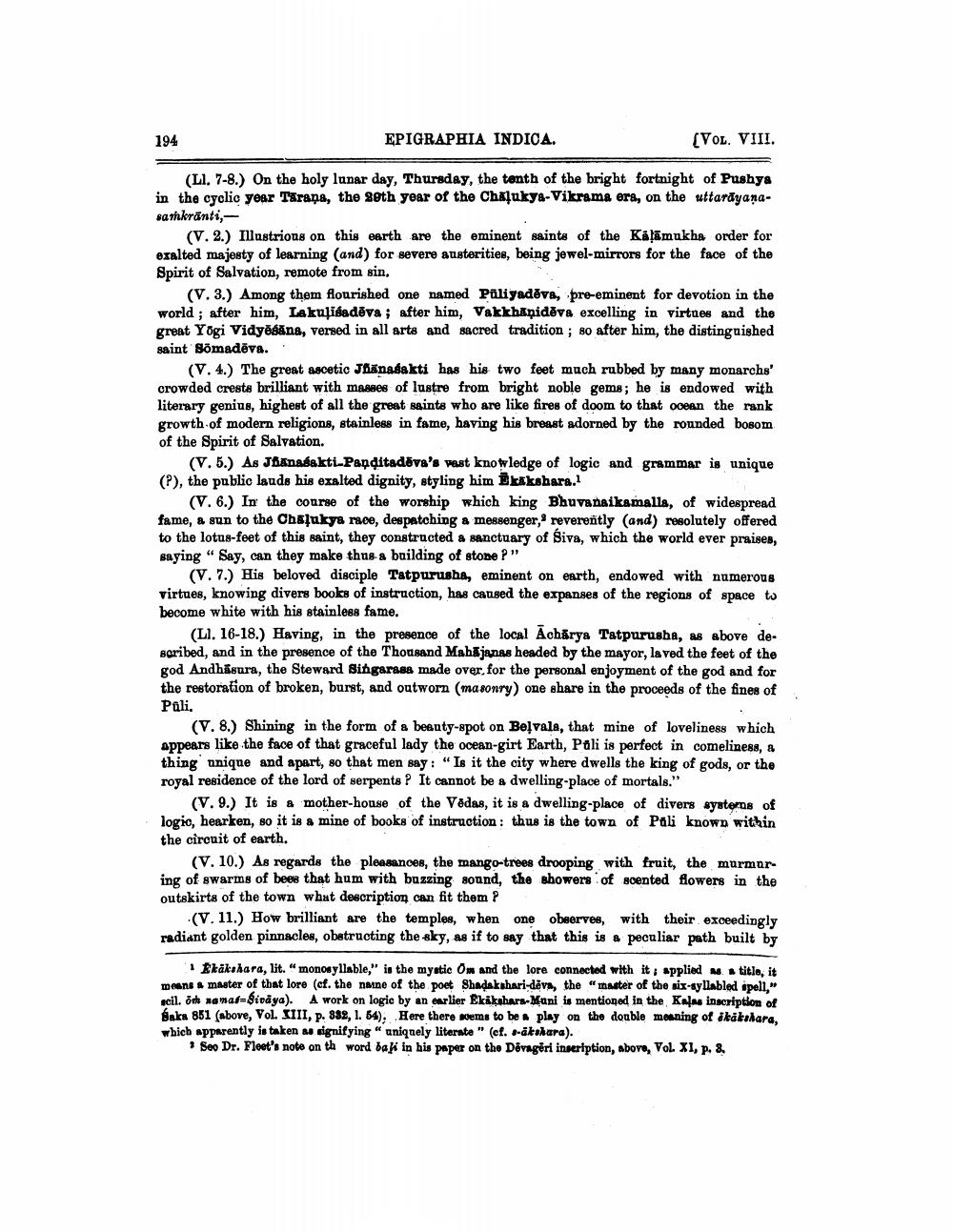________________
194
EPIGRAPHIA INDICA.
(VOL. VIII.
(LI. 7-8.) On the holy lunar day, Thursday, the tenth of the bright fortnight of Pushya in the cyclic year Tarana, the 29th year of the Chalukya-Vikrama era, on the uttarāyanasamkrānti, -
(V. 2.) Illustrions on this earth are the eminent saints of the Kaļāmukha order for exalted majesty of learning (and) for severe austerities, being jewel-mirrors for the face of the Spirit of Salvation, remote from sin,
(V. 3.) Among them flourished one named Puliyadova, pre-eminent for devotion in the world; after him, Lakuļisadēva ; after him, Vakkhanideva excelling in virtues and the great Yogi Vidyēdāns, versed in all arts and sacred tradition; so after him, the distinguished saint Somadēva.
(V. 4.) The great ascetic Jhānasakti has his two feet much rubbed by many monarchs' crowded crests brilliant with masses of lustre from bright noble gems; he is endowed with literary genius, highest of all the great saints who are like fires of doom to that ocean the rank growth of modern religions, stainless in fame, having his breast adorned by the rounded bosom of the Spirit of Salvation.
(V.5.) As Janatakti Panditadēva's vast knowledge of logic and grammar is unique (?), the public lauds his exalted dignity, styling him Drakshara.
(V. 6.) In the course of the worship which king Bhuvanaikamalla, of widespread fame, a sun to the Chalukya race, despatching a messenger, reverently (and) resolutely offered to the lotus-feet of this saint, they constructed a sanctuary of Siva, which the world ever praises, saying " Say, can they make thus a building of stone "
(V. 7.) His beloved disciple Tatpurusha, eminent on earth, endowed with numerous virtues, knowing divers books of instruction, has caused the expanses of the regions of space to become white with his stainless fame.
(LI. 16-18.) Having, in the presence of the local Acharya Tatpurusha, as above deseribed, and in the presence of the Thousand Mahājanas headed by the mayor, laved the feet of the god Andhäsura, the Steward Singarasa made over for the personal enjoyment of the god and for the restoration of broken, burst, and outworn (masonry) one share in the proceeds of the fines of Pūli.
(V. 8.) Shining in the form of a beanty-spot on Beļvala, that mine of loveliness which appears like the face of that graceful lady the ocean-girt Earth, Poli is perfect in comeliness, thing unique and apart, so that men say: "Is it the city where dwells the king of gods, or the royal residence of the lord of serpents ? It cannot be a dwelling-place of mortals."
(V. 9.) It is a mother-house of the Vodas, it is a dwelling-place of divers systems of logic, hearken, so it is a mine of books of instruction : thus is the town of Pali known within the circuit of earth.
(V. 10.) As regards the pleasances, the mango-trees drooping with fruit, the marmoring of swarms of bees that hum with buzzing sound, the showers of scented flowers in the outskirts of the town what description can fit them?
(V. 11.) How brilliant are the temples, when one observes, with their exceedingly radiant golden pinnacles, obstructing the sky, as if to say that this is a peculiar path built by
Ekakahara, lit." monosyllable," is the mystic Om and the lore connected with it applied m . title, it mens master of that lore (cf. the naine of the poet Shadakahari-dēva, the "master of the six-syllabled ipell."
cil, örh namarSivaya). A work on logie by an earlier Ekakahara-Mani is mentioned in the Kiln inscription of Saka 851 (above, Vol. XIII, p. 882, 1. 64), Here there woems to be play on the double meaning of eakalara, which apparently is taken a signifying "uniquely literate" (cf. -akshara).
* Seo Dr. Fleet's note on th word bali in his paper on the Dövagēri inseription, above, VoL XI, p. 8.




